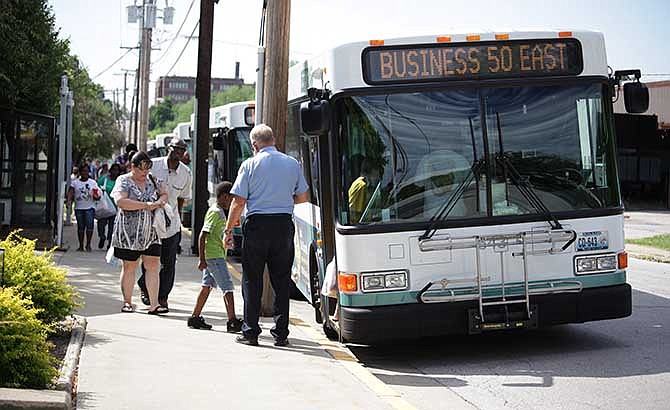As Jefferson City examines options for its outdated transit facilities, there's potential for a new facility near Menards.
The existing facility on East Miller Street has been the subject of discussion for several years, with quality of life improvements -- including bathrooms and a shelter at the transfer site a decade ago. Since then, much of the focus has been on broader fixes.
Various city stakeholders came together to compile a feasibility study for an expansion, with three sites ultimately examined for the project: The existing Miller Street facility, land along Hyde Park and a plot of land near Menards.
City Engineer David Bange presented the study before the Public Transit Advisory Committee on Tuesday afternoon, walking the group through a set of plans that would see a 25 percent larger bus barn, 50 percent larger office area and a maintenance area around 1½ times larger than the existing one.
Given the size of the planned facility and the need for ample room for future expansion, Bange and the committee agreed the tract of land near Menard's was the most feasible option.
"Ultimately, everything that we would want on the site -- our central maintenance building, bus barn, carwash, fuel station and then, ultimately, the JeffTran administration building -- would all fit here quite easily," Bange said.
Bange noted the city had been in discussions with the Farmer Group, which owns the land. While it had been intended for commercial use, he said the owners were willing to go to the table for negotiations on a sale if plans were approved.
"From our perspective, purchasing the entire site to have additional space for expansion in the future," Transit Division Director Mark Mehmert said. "It's a good central spot. We've been needing to have something much better on the western edge of town for quite some time, and this would accomplish that."
Bange will be presenting the report before various other city entities in the coming weeks, with the goal of showing the proposal to the Federal Transportation Administration (FTA) for potential grants to help cover the cost of the project.
Mehmert also said the city would likely receive two new hybrid buses -- which are buses that use conventional combustion engines as well as an electric propulsion system -- to replace part of its fleet. The department was the only one of its kind to apply with the Missouri Department of Transportation for a federal grant it proposed would be used to purchase a more sustainable replacement for vehicles at the end of their productive lifecycles. MoDOT had opened filing for the funds after another agency was unable to use them.
Mehmert said the 35-foot buses would cut down on gas costs while easing maintenance requirements.
"The hybrid buses we believe will be economical," Mehmert said. "Over the long run, we'll come out ahead with the hybrid buses. With today's more elevated prices, we think we're going to come out ahead, and they should have a little less maintenance because of the batteries that are in them."
He said many of the city's buses had passed the 14-year and 50,000-mile useful lifetime. He said there would be a determination into which of the buses currently in use would be retained as a backup.
The grant is subject to approval by the FTA. Supply chain issues could also impact the timeline for the new buses if approved.

